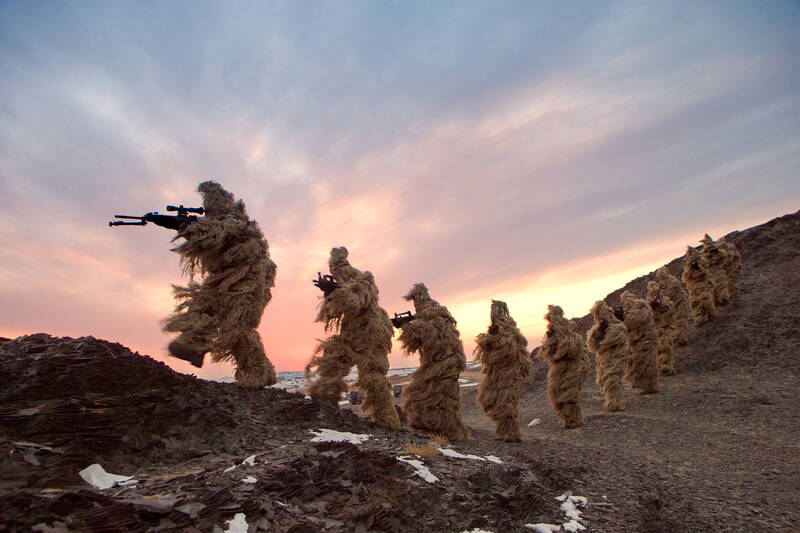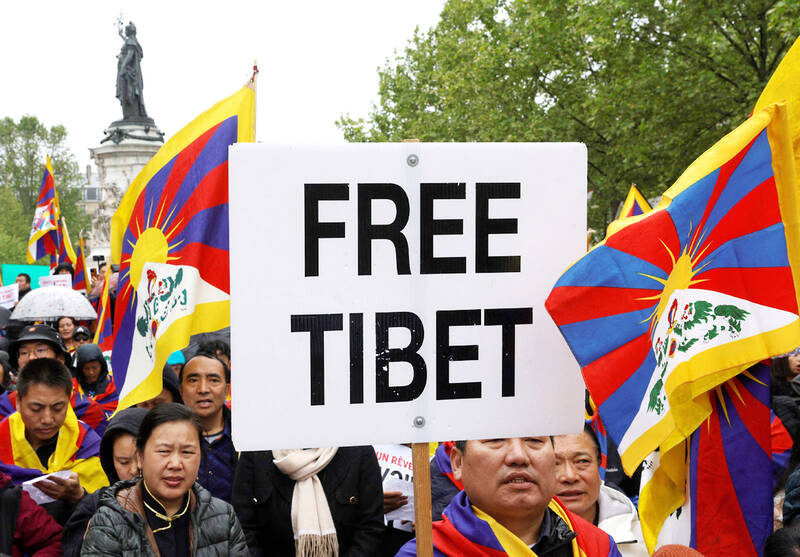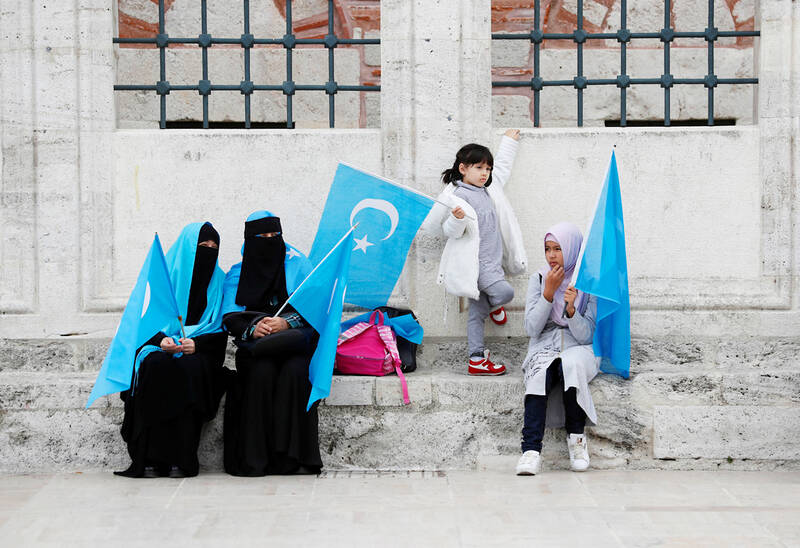A quarter of the world’s countries have engaged in transnational repression — targeting political exiles abroad to silence dissent — in the past decade, new research reveals.
The Washington DC-based non-profit organization Freedom House has documented 1,219 incidents carried out by 48 governments across 103 countries, from 2014 to last year.
However, a smaller number of countries account for the vast majority of all documented physical attacks on dissidents, with China the most frequent offender, responsible for 272 incidents, or 22 percent of recorded cases. Russia, Turkey and Egypt also rank among the worst perpetrators.

Photo: Reuters
High-profile incidents of transnational repression include the 2018 murder of journalist Jamal Khashoggi by a hit squad at Saudi Arabia’s consulate in Istanbul. The Russian president, Vladimir Putin, has targeted his foes in the UK, including the 2006 radiation poisoning of the Russian dissident Alexander Litvinenko. This was followed by a string of more than a dozen other suspicious deaths of Russians on British soil that are also suspected of being tied to the Kremlin.
Transnational repression is the state-led targeting of refugees, dissidents and ordinary citizens living in exile. It involves the use of electronic surveillance, physical assault, intimidation and threats against family members to silence criticism.
“This happens inside democracies,” said Yana Gorokhovskaia, research director of Freedom House. “Every year, we record cases in places like the United States, Canada, the UK, France, Germany and Sweden. That would probably surprise people because I think there’s an assumption that there’s a level of protection and that autocrats can’t reach into democracies.”

Photo: AFP
Iran is also featured in the top 10 perpetrators, with 47 cases logged over the timeframe of the research. Several of these campaigns have been publicly exposed in recent years.
In 2023, journalists at the BBC Persian news outlet were targeted with offensive messages and threats of sexual assault. In March last year, a presenter for Iran International, a Farsi-language news channel, was stabbed outside his home in Wimbledon, south London.
Muslims bear the heaviest burden of transnational repression, accounting for 64 percent of targeted incidents worldwide.

Photo: Reuters
The Uighurs, a mostly Muslim ethnic group from northwest China that are the target of widespread crimes against humanity within the country, are subjected to sustained monitoring, threats and policing by the Chinese authorities, according to the research.
“Uighurs don’t have to be activists to be targeted,” said Gorokhovskaia. “It’s not that censoring themselves would solve this problem for them. It’s because their whole group is viewed as a threat, and so that’s why they’re being targeted.”
In 2022 a spyware campaign targeting Uighurs by posing as Android apps, including messaging services, was discovered by cybersecurity experts. Chinese students living abroad, including in the UK, have also reported being watched and followed.

Photo: AFP
China has been accused of operating secret police stations around the world to monitor and repress opponents of the ruling Communist party. In 2023, US authorities discovered an illegal Chinese police station operating from an office in New York. Beijing had also targeted Tibetans and Hongkongers, said Gorokhovskaia.
“We’re struggling with the magnitude of what the People’s Republic of China is doing. It’s everywhere, on campuses. It’s through social media and online communication. It’s threats against people’s families. China has also made a concerted effort to expand extradition agreements all around the world,” Gorokhovskaia said.
Journalists are among those most at risk of repression campaigns, frequently facing cross-border intimidation as authoritarian governments seek to silence critical reporting. Since 2014, at least 26 governments have orchestrated 124 incidents of transnational repression against exiled journalists, highlighting the growing threat to press freedom on a global scale.
Freedom House documents cases using publicly available information that can be externally confirmed, such as media reports, NGO reports, reports by the UN and other information based on private reporting and civil society activism. Most cases go unreported, however, it says, as targets are scared into silence.
“The purpose of transnational repression is to silence criticism, to scare people and stop whatever activism they’re engaged in,” said Gorokhovskaia. “I don’t think people are reporting what’s happening to them. They’re choosing to censor, if to ensure their safety or the safety of their families.”

Nine Taiwanese nervously stand on an observation platform at Tokyo’s Haneda International Airport. It’s 9:20am on March 27, 1968, and they are awaiting the arrival of Liu Wen-ching (柳文卿), who is about to be deported back to Taiwan where he faces possible execution for his independence activities. As he is removed from a minibus, a tenth activist, Dai Tian-chao (戴天昭), jumps out of his hiding place and attacks the immigration officials — the nine other activists in tow — while urging Liu to make a run for it. But he’s pinned to the ground. Amid the commotion, Liu tries to

The slashing of the government’s proposed budget by the two China-aligned parties in the legislature, the Chinese Nationalist Party (KMT) and Taiwan People’s Party (TPP), has apparently resulted in blowback from the US. On the recent junket to US President Donald Trump’s inauguration, KMT legislators reported that they were confronted by US officials and congressmen angered at the cuts to the defense budget. The United Daily News (UDN), the longtime KMT party paper, now KMT-aligned media, responded to US anger by blaming the foreign media. Its regular column, the Cold Eye Collection (冷眼集), attacked the international media last month in

A pig’s head sits atop a shelf, tufts of blonde hair sprouting from its taut scalp. Opposite, its chalky, wrinkled heart glows red in a bubbling vat of liquid, locks of thick dark hair and teeth scattered below. A giant screen shows the pig draped in a hospital gown. Is it dead? A surgeon inserts human teeth implants, then hair implants — beautifying the horrifyingly human-like animal. Chang Chen-shen (張辰申) calls Incarnation Project: Deviation Lovers “a satirical self-criticism, a critique on the fact that throughout our lives we’ve been instilled with ideas and things that don’t belong to us.” Chang

Feb. 10 to Feb. 16 More than three decades after penning the iconic High Green Mountains (高山青), a frail Teng Yu-ping (鄧禹平) finally visited the verdant peaks and blue streams of Alishan described in the lyrics. Often mistaken as an indigenous folk song, it was actually created in 1949 by Chinese filmmakers while shooting a scene for the movie Happenings in Alishan (阿里山風雲) in Taipei’s Beitou District (北投), recounts director Chang Ying (張英) in the 1999 book, Chang Ying’s Contributions to Taiwanese Cinema and Theater (打鑼三響包得行: 張英對台灣影劇的貢獻). The team was meant to return to China after filming, but